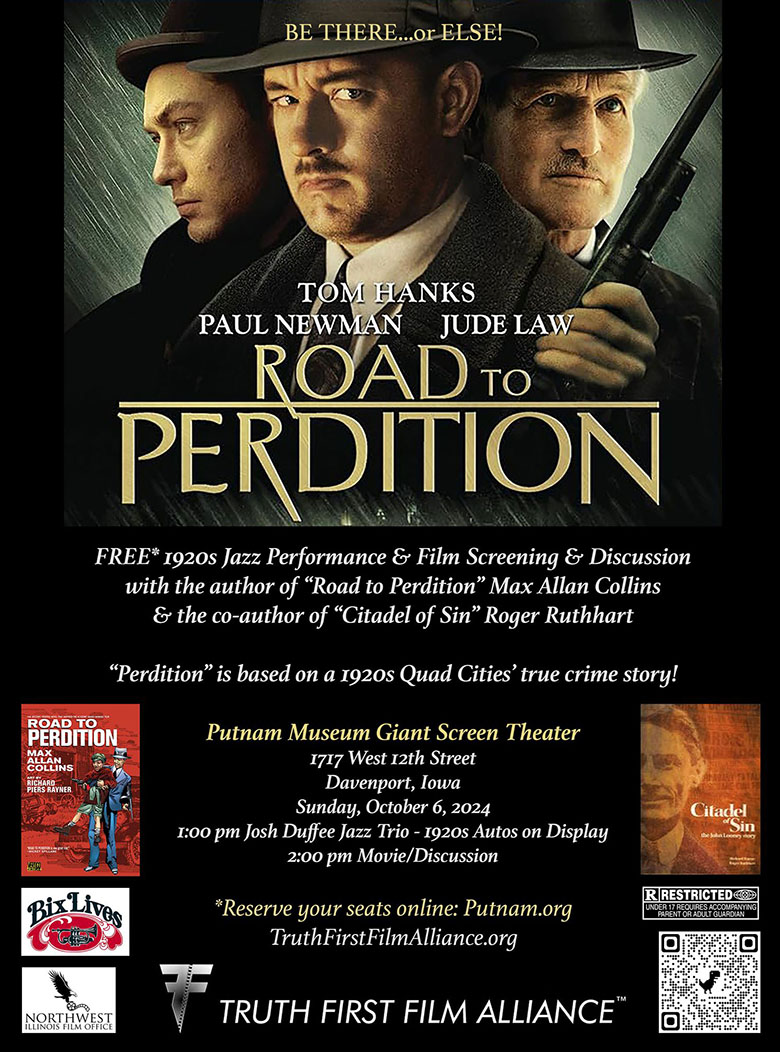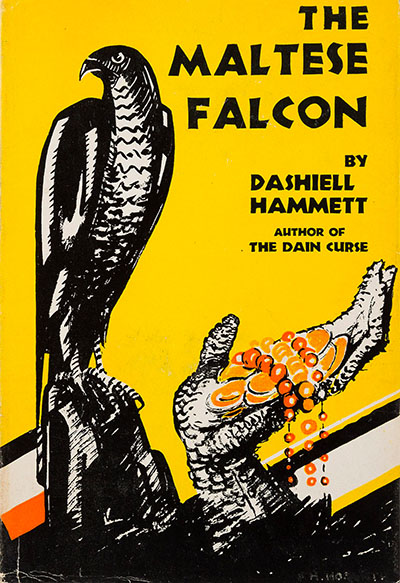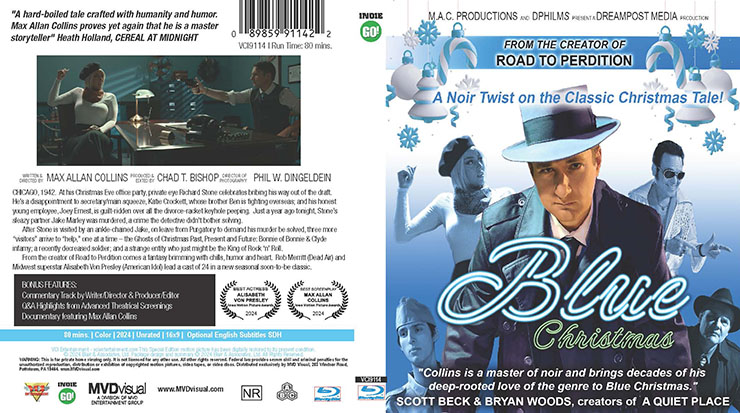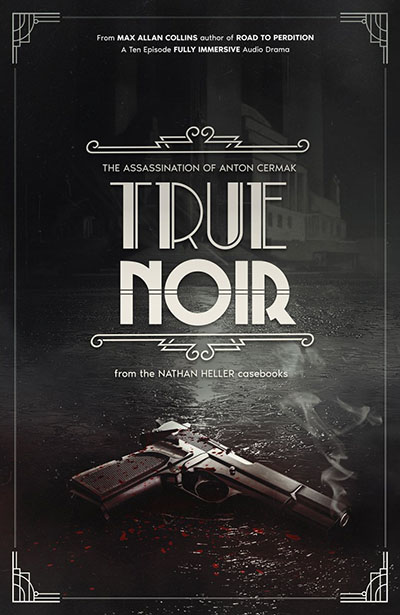The last recording session with Michael Rosenbaum playing Nate Heller in True Noir: The Assassination of Anton Cermak is scheduled for the day this update appears. Director Robert Meyer Burnett is doing a terrific job editing this ten-part audio drama (written by me), handling to perfection the huge cast of name performers in bringing the first Nate Heller novel, True Detective, to life.
First episodes will be available SOON.

The Putnam Museum in Davenport, Iowa, did a special event on this past Sunday (Oct. 6) centering on Road to Perdition, both the book(s) and film. The 2002 film, which Barb and I hadn’t seen for some time, was shown on the museum’s massive I-Max screen. Following this impressive presentation, which played to a nearly full house approaching 300, I participated in a Q and A with Roger Ruthhart, co-author of Citadel of Sin, a non-fiction account of the John Looney gangster story.
I fielded a lot of questions about the differences between the actual history and my graphic novel (and its prose follow-ups), including why John Looney as portrayed by Paul Newman became John Rooney, and why I moved Looney’s story up a decade or so in time. The deft questioning was handled by Truth First Film Alliance’s Travis Shepherd. The Alliance is the work of well-known documentary filmmakers Kelly and Tammy Rundle, perhaps best known for Villisca: Living with a Mystery, focusing on my mysterious Iowa crime in the Lizzie Borden mode. The Rundles put this event together and were gracious hosts.
And the audience had any number of good questions for both Mr. Ruthhart and myself (including a couple of Quarry and Ms. Tree ones!).
The movie looked great on the big screen, but could have looked better if Paramount would get around to releasing Road to Perdition on 4K.

Tammy and Kelly Rundle, Emmy-winning documentarians

Robert J. Randisi
Many of you have already heard the sad news of Bob Randisi’s passing.
Robert J. Randisi was undoubtedly the last of the Old School pulp writers. He wrote over 500 entries in his adult western series, the enormously successful Gunsmith. He was an instrumental figure in celebrating genre fiction, receiving a Lifetime Achievement award from The Private Eye Writers of America; and another Lifetime Achievement award from Western Fictioneers. He was a founder of both groups. He also began the influential, much-missed Mystery Scene Magazine with another late friend of mine, the great Ed Gorman.
Do not assume Bob received those lifetime achievement awards because he founded the groups that honored him with them. He had made it clear he had no interest in awards of that nature. I am proud to have been instrumental in getting him the Private Eye Writers of America award and made sure it focused on his work as a writer of private eye fiction, which was his real true love in genre fiction. His series P.I. novels included the characters Miles Jacoby, Joe Keough, Nick Delvecchio, Gil and Claire Hunt, Truxton Lewis, and Eddie G. with The Rat Pack. Whew! He was nominated several times for Shamus awards, the honor given to the best private eye novels of the year.
Bob was my oldest and dearest friend in the writing game. He and Ed Gorman were together the friends I most valued in this business, and I miss them both (they were great friends to each other as well – Ed referred to Bob as his “little brother). To say Bob and I go way back is an understatement.
Bob was the first fan – and at that time he was a fan, just breaking into the business with some short stories – not from my home town area who had read my first two novels, Bait Money and Blood Money, and professed to love them and the Nolan series. He sought me out at the first Bouchercon I ever attended (decades ago in Chicago) and we sat deep into the night with him making me tell him the plots of the three more Nolan novels I’d written that had been shelved by Popular Library when they swallowed up Curtis Books, who had published Bait and Blood. Eventually those books were published by Pinnacle, but Bob heard the stories from the horse’s mouth that night in Chicago.
When I wrote True Detective in 1981 (or was it ‘82?) my then-agent Knox Burger was so unenthusiastic about it I fired him on the phone. Knox was influential and important in the genre – he’d been the editor at Gold Medal Books and the fiction editor of Collier’s before that – and he’d seemed stunned when an upstart kid in Iowa fired him. I was stunned, too, and called Bob desperate for advice.
Bob sent me to his agent, Dominick Abel, having paved the way with this already influential agent, and Dominick has been my friend and representative ever since. Dominick called me with the sad news about Bob, who had been his client till the end. Bob probably wrote and sold more books than the rest of Dominick’s clients put together, myself included.
Bob never called just to chat. He had a business-like side, was doggedly unsentimental, but also blessed with a great sense of humor. And when we got together, usually at a Bouchercon, we almost always sat side by side at the dinners and various events. He was the kind of friend you don’t see for a while, but then when you do, no time has passed at all.

The best compliment I can pay him is that he was a pro. A consummate pro. But the compliment I really want to pay him is to simply say thanks for being a friend to me and to every private eye writer of the mid-Twentieth Century until, well, right now.
Let be clarify that, because it might seem like hyperbole. If anything it’s an understatement. I can only speak from personal experience and forgive me for what may seem over the top or self-aggrandizing. My novel True Detective was a breakthrough for me, but it was ignored by the Mystery Writers of America despite its stellar reviews and general success. Because Bob created the Private Eye Writers of America, I got a second chance at winning (as the Old Man in A Christmas Story put it) a major award. I beat a bunch of big names – James Crumley, Loren D. Estleman, Stanley Ellin, and Robert B. Parker, no less. The Shamus award – Bob’s creation – put me on the map.
Mickey Spillane received several awards from the PWA – the first ever in a long career that had given the entire Private Eye genre a second lease on life. Numerous writers, now celebrated, got their start because of Bob’s organization’s boost. For decades, the Shamus was second only to the Edgar in importance in the genre. Perhaps it still is.
But it’s faded a tad, largely because Bob’s declining health (and Covid played a role) chipped away at the annual (and great fun) awards dinners that were held in conjunction with Bouchercon every year. He and his incredible significant other Marthayn Pelegrimas always put on a great dinner and a fun show. Unless someone picks up the banner, the Shamus would appear to have become just another of the various awards given in a group at Bouchercon. Nothing wrong with that, I guess.
But those days were wonderful. And I hope the significance of the Shamus awards remains strong, perhaps even makes a comeback that would include the restoration of an annual awards dinner. That would be the best tribute possible to the writing legend that was Robert J. Randisi.
M.A.C.





